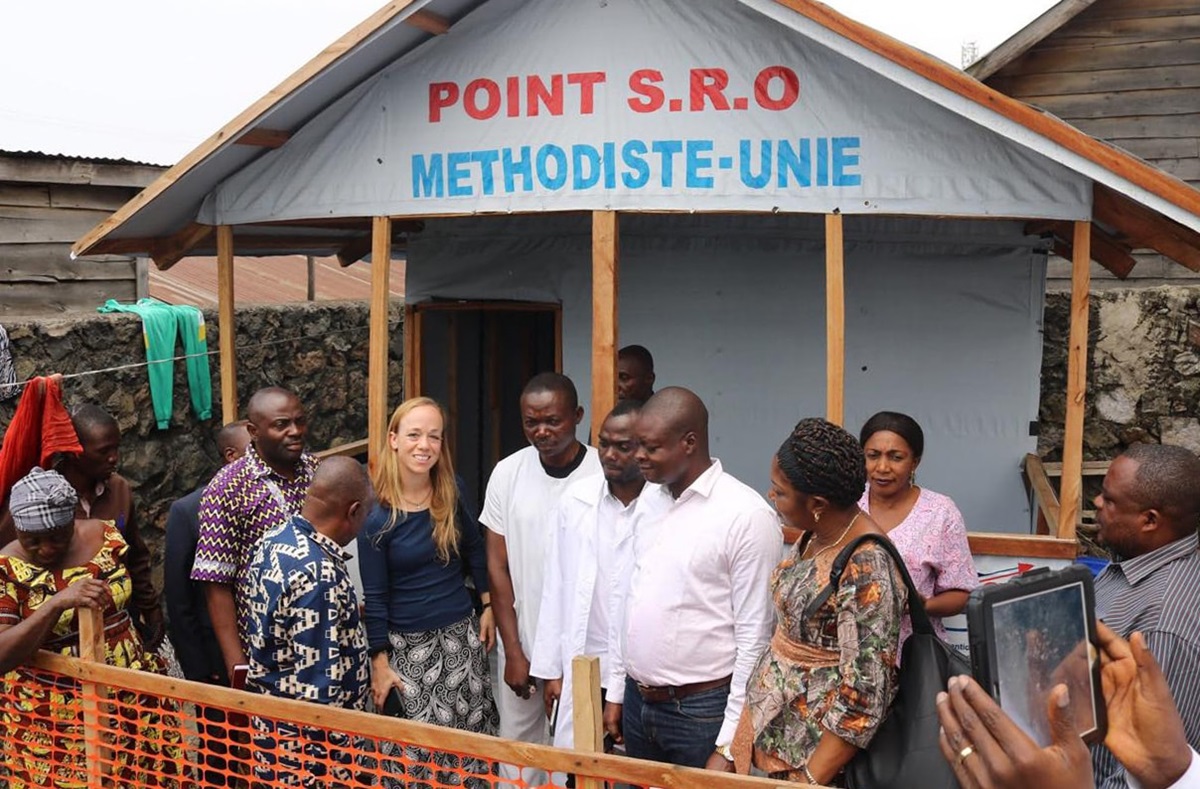While the World Health Organization has declared Congo’s Ebola outbreak a public health emergency, a cholera epidemic also is raising concerns in the North and South Kivu provinces.
Emery Lohandjola, nurse manager of Majengo Health Center — a United Methodist hospital in Goma — said he fears the worst for his area. More than 37 cases of cholera were observed in July and the number has continued to increase in August, he said. From Aug. 1-20, there have been at least 45 cases of cholera reported at the health center.
“My health area is very much exposed by this cholera outbreak because there is a lack of drinking water,” Lohandjola said.
Cholera is an infectious disease usually spread through contaminated water. It causes severe diarrhea and dehydration and can be deadly if left untreated.
In May, Congo’s Ministry of Health, with support from the World Health Organization, began a vaccination campaign aimed at immunizing more than 800,000 people against cholera in North Kivu, according to ReliefWeb.
Despite those efforts, at least four people have died from cholera since July 5 in Goma and the neighboring Nyiragongo territory, according to health authorities in the region.
Action and Intervention for Development and Social Coaching, a local organization that helps health facilities fight cholera, set up a health checkpoint outside of Majengo Health Center in June to deal with cholera cases.
The Rev. Omole Owandjakoyi expressed concern about the cholera epidemic in his ecclesiastical district of Goma, which has more than 8,000 members.
How to help
Donate to the Abundant Health initiative, United Methodist Board of Global Ministries.
“I have made a commitment to warn (the council) of this danger (so) that everyone can begin to raise their family's awareness of basic hygiene rules.”
Dr. Damas Lushima, general coordinator of health for the church in Eastern Congo, blamed overcrowding and an often unhealthy water supply for the outbreak in Goma.
“Cholera outbreaks can occur sporadically in any part of the world where water supplies, sanitation, food safety and hygiene practices are poor. Overcrowded communities that live in poor sanitation and do not have a safe drinking water supply are those most commonly affected,” he said.
“As a church, we will first have to start educating our communities about the rules of hygiene and make pleadings with our health partners to find water supplies in this area ...,” he said.
The Rev. Kinane Chrisostome of Amani United Methodist Church in Goma educated his members during Sunday service on Aug. 25 about how to wash hands properly to prevent “dirty hands diseases” like cholera.
“I will take every Sunday, even five minutes, to sensitize the faithful on washing hands to fight against diseases of dirty hands,” he said.
Chrisostome received training from Megan Klingler with the United Methodist Board of Global Ministries’ Global Health unit, who arrived in Congo last week. A nurse from Montana, Klingler is visiting six cities during her three-week trip to conduct training sessions to help stop the spread of Ebola by healthcare workers, providers and family caregivers.
Subscribe to our
e-newsletter
Like what you're reading and want to see more? Sign up for our free daily and weekly digests of important news and events in the life of The United Methodist Church.
Jean Baptiste Shukuru Sanzabere, a nurse in the Methodist health area, said the lack of water during the dry season is compounding the cholera problem.
“Although (Action and Intervention for Development and Social Coaching) supports us, we are sometimes overwhelmed by the new cases, which are increasing from day to day. Sometimes, there is deficiency of drugs,” he said.
In neighboring South Kivu, cholera cases have been observed in the districts of Uvira and Bukavu, said Dr. Claude Watukalusu, a doctor in the Kivu Conference.
He said in these areas, the population sometimes consumes lake or river water.
“It is a practice that we will have to sensitize our communities to consume only drinking water,” he said.
Bishop Gabriel Yemba Unda said he was concerned by the repetitive epidemics in East Congo.
“We are a connectional church and I ask men of good will to help us,” he said.
Kituka Lolonga is a communicator in the Kivu Conference.
News media contact: Vicki Brown, news editor, [email protected] or 615-742-5469. To read more United Methodist news, subscribe to the free Daily or Weekly Digests.
Like what you're reading? Support the ministry of UM News! Your support ensures the latest denominational news, dynamic stories and informative articles will continue to connect our global community. Make a tax-deductible donation at ResourceUMC.org/GiveUMCom.




